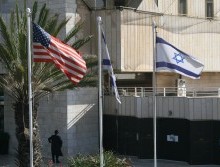
Iran has plenty of hate to go around both Israel and the US. Illustrative US, Israeli flags. By Joshua Spurlock
The most powerful man in Iran, Supreme Leader Ayatollah Khamenei unleashed invective and accusations against the United States and Saudi Arabia on Monday, with the Saudis getting accused of treason for supposedly seeking to become more friendly with Israel. The diatribe comes after former Saudi general Dr. Anwar Eshki visited Israel to discuss the Arab Peace Initiative as a solution to the conflict with the Palestinians.
“Revelation of Saudi government’s relations with Zionist regime was stab in the back [of the Islamic world],” a Twitter feed with ties to Khamenei said on Tuesday. On the Khamenei website, the Iranian leader continued the accusations, calling the Saudi’s supposed effort to normalize relations with Israel—which former Saudi general Eshki himself denied—“an immense sin and treason.” Khamenei claimed the US is involved as well, arguing the Saudis are “controlled” by the Americans. And that was just part of what he had to say about the US.
Slamming the perceived lack of American actions in fulfillment of the nuclear pact signed with Iran, the Khamenei-linked account tweeted, “Americans want to take everything & give nothing. Talks with US on regional issues is a lethal poison & they cannot be trusted in any issue.”
However, expert Mark Fitzpatrick, director of the non-proliferation program at the International Institute for Strategic Studies (IISS), recently told the Tehran Times that while Iran hasn’t received all the economic benefits they thought they would receive, “this is not the fault” of the American government.
Fitzpatrick pointed to Iran’s own lack of banking transparency and wide-scale involvement of the sanctioned paramilitary Iranian Revolutionary Guard Corps (IRGC) in their economy as roadblocks to fuller international business relations.
The Khamenei website quoted the Iranian leader as also insinuating that the failed coup in Turkey was an American plot because Turkey was becoming too Islamic.
Anti-American and anti-Israel rhetoric is nothing new for Khamenei, who regularly has sounded the hardliner views against both nations, including calling Israel a “cancer” in the past.
(By Joshua Spurlock, www.themideastupdate.com, August 1, 2016)
